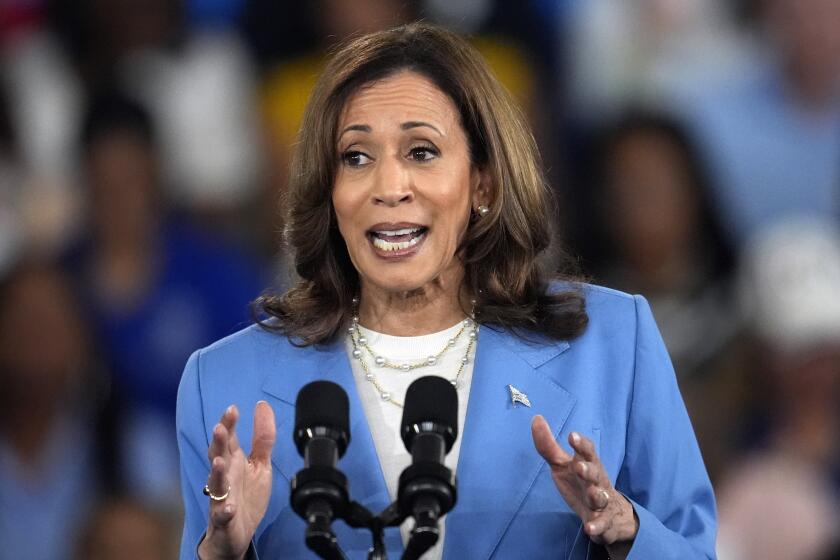Midterm election’s big loser is the political center
The political center, where swing voters reside and compromise happens, is suddenly a much smaller part of the Washington landscape.
There were the usual kind words and olive branches extended on Wednesday. But nothing could hide the fact that the two parties have deep and abiding differences on nearly every issue facing Congress. The composition of the House and Senate may have changed, but not Washington: The place may be more polarized than ever.
That could make it exceedingly difficult to accomplish anything of great magnitude between now and the next presidential election in November 2012.
The clearest indication of the growing partisan gap was Tuesday’s rout of the Blue Dog caucus, a group of moderate and conservative Democrats who urged the party to adopt a more business-friendly and fiscally conservative agenda. Fewer than half of its 54 members will be returning next year after incumbents were ousted in Pennsylvania, Ohio and a few Democratic pockets of the Deep South. Their absence will likely push the 190 or so remaining House Democrats even further left.
On the Republican side, the victory of dozens of insurgents backed by the “tea party” movement means the emboldened GOP majority will be even more conservative and confrontational than the one that harried President Obama over the last two years.
These lawmakers, and the legion of activists who plan to monitor their performance, have called for drastic changes, including eliminating the Department of Education, privatizing parts of Social Security and repealing the healthcare law just now starting to take effect.
After the presidency, the most difficult job in Washington may soon fall to Rep. John A. Boehner of Ohio, the Republican leader who will likely be the next House speaker. He must balance an agenda that satisfies his fervent tea party caucus without scaring off the voters — politically independent, largely nonideological — who delivered the GOP its big win Tuesday.
It was something Newt Gingrich, the House speaker after the last big GOP landslide in 1994, failed to manage when he led a similar class of zealously partisan freshmen. President Clinton, who had to argue after the so-called Republican Revolution that he was still relevant, romped to reelection just two years later.
Extensive polling, including thousands of voter interviews conducted Tuesday, shows that neither party is well regarded. The election was the third in a row in which 20 or more House seats changed hands, a level of upheaval unseen in more than half a century; these days, voters seem willing to discard unwanted politicians like so much used tissue.
But that hasn’t stopped both sides from claiming to speak for a majority of Americans. A mandate is in the eye of the beholder, and Jenny Beth Martin, national coordinator of the Tea Party Patriots, an online conservative network, seemed to speak for many when she suggested compromise was a good thing — so long as others were doing the compromising.
“We hope that rather than having the gridlock, that the House and Senate will work together to find a way to be responsible with our money again and the other side will move to the center,” Martin said. “Because our side is the center.”
Boehner and Senate Majority Leader Harry Reid of Nevada, who may soon be dueling each day on Capitol Hill, said much the same thing. Both nodded toward the notion of compromise, with qualification.
“We hope President Obama will now respect the will of the people, change course and commit to making the changes they are demanding,” Boehner said. “To the extent he is willing to do this, we are ready to work with him.”
Reid, fresh off reelection in Nevada, said “the time for politics is now over.” He then suggested Republicans “must take their responsibility to present bipartisan solutions more seriously. Simply saying ‘no’ will do nothing to create more jobs, support our middle class and strengthen our economy.”
None of which bodes well for a new era of comity and bipartisan cooperation.
“If you’re a betting person, I would bet on less rather than more being accomplished in Washington,” said Geoff Garin, a longtime Democratic strategist.
If politicians look to the people for guidance, as they presumably should, they are likely to come away confused.
Voters say they hate gridlock, but many also seemed to hate the prolific legislative output of the Obama administration and the Democratic majorities in the House and Senate. Asked what lawmakers should make their top priority in the next Congress, nearly 4 in 10 said reducing the federal deficit. A like number said spending money to create jobs, a move that would increase the deficit. (Two in 10 said cutting taxes, which would also increase the debt.)
On a more fundamental level, voters sent similarly contradictory signals. Nearly 8 in 10 said in a Pew Research poll that lawmakers’ unwillingness to work together was a major problem. But in a subsequent survey, nearly half said they admired a politician who sticks to principle rather than compromising.
Clearly, voters are conflicted. More than ever, they have a government in Washington to match their mood.
kathleen.hennessey@latimes.com
More to Read
Get the L.A. Times Politics newsletter
Deeply reported insights into legislation, politics and policy from Sacramento, Washington and beyond. In your inbox three times per week.
You may occasionally receive promotional content from the Los Angeles Times.












